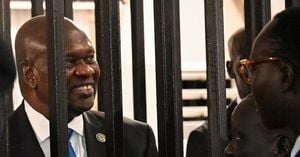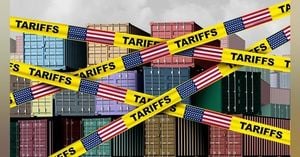The diplomatic relationship between the United States and Brazil has entered a turbulent new phase following the U.S. government's decision to impose sanctions on Viviane Barci de Moraes, the wife of Brazilian Supreme Court Justice Alexandre de Moraes. The move, announced on Monday, September 22, 2025, comes just days after Brazil's Supreme Court handed down a 27-year prison sentence to former president Jair Bolsonaro for his role in an attempted coup following his defeat in the 2022 presidential election.
According to Devdiscourse, the U.S. sanctions were enacted under the Magnitsky Act, a law designed to target foreign officials implicated in human rights abuses and corruption. The measures not only affect Viviane Barci de Moraes but also extend to the Institute of Legal Studies (Lex), a Sao Paolo-based firm linked to the de Moraes family. The sanctions prohibit both Barci de Moraes and Lex from engaging in any economic activity with U.S. citizens or companies, freeze their assets, and suspend their visas. The Treasury Department also revoked visas for several other Brazilian judicial figures, escalating the already tense situation between the two countries.
The U.S. government has not minced words in explaining its rationale. Treasury Secretary Scott Bessent declared, "Alexandre de Moraes is responsible for an oppressive campaign of censorship, arbitrary detentions, and politicized prosecutions — including against former President Jair Bolsonaro." Echoing this sentiment, U.S. Secretary of State Marco Rubio accused de Moraes of "weaponizing courts, authorizing arbitrary pre-trial detentions, and suppressing freedom of expression." These statements, reported by Devdiscourse and other outlets, underscore the depth of American disapproval for Brazil's recent judicial actions against Bolsonaro and his allies.
This is not the first time Alexandre de Moraes has found himself in Washington's crosshairs. Back in July, the United States sanctioned the Supreme Court Justice directly, citing similar concerns about his handling of high-profile political cases. But the latest actions represent a significant escalation, targeting not only judges but also their family members and affiliated institutions. The U.S. has warned financial institutions worldwide that they could face penalties for conducting business with any of the sanctioned individuals or entities, a move designed to maximize the pressure on Brazil's judiciary.
For the Brazilian government, the U.S. sanctions have triggered a fierce backlash. Officials in Brasilia have condemned the measures as blatant violations of Brazilian sovereignty and international law. They argue that the United States is interfering in Brazil's domestic affairs, particularly in the wake of Bolsonaro's conviction, which the Brazilian judiciary insists was conducted according to the country's legal norms. The Supreme Court's sentence against Bolsonaro—27 years in prison for his involvement in the January 2023 coup attempt—was handed down after months of heated legal and political debate, with Justice de Moraes playing a central role in overseeing the proceedings.
The case against Bolsonaro has been a flashpoint in Brazilian politics ever since the former president lost the 2022 election to Luiz Inacio Lula da Silva, a leftist leader who returned to power after a previous stint as president. Bolsonaro's supporters have decried the trial as a political witch hunt, a view echoed by former U.S. president Donald Trump, who remains a vocal ally of Bolsonaro. Trump has repeatedly denounced the coup-plot trial, calling it a "witch hunt" and accusing Brazilian authorities of using the courts to silence political opponents.
Amid this backdrop, the Trump administration has made it clear that its ultimate goal is to see Brazil's Congress pass a proposed amnesty bill. The bill, currently under debate, would offer legal protection to Bolsonaro and his supporters for their actions surrounding the 2023 coup attempt. U.S. officials have hinted that passage of the amnesty bill could pave the way for lifting the sanctions, making it a critical bargaining chip in the ongoing diplomatic standoff.
The sanctions have also had immediate practical effects. The Lex Institute, a prominent legal studies firm in Sao Paolo, now finds itself barred from engaging in any business with American partners. Assets linked to both Lex and Barci de Moraes have been frozen, and their visas—along with those of several other judicial figures—have been suspended. U.S. authorities have gone a step further, warning global financial institutions that they could face penalties if they continue to do business with the sanctioned parties. This sweeping approach is designed to isolate key figures in Brazil's judiciary and apply maximum leverage on the country's political system.
Reactions within Brazil have been divided. Supporters of Bolsonaro and some segments of the political right argue that the U.S. is standing up for democratic principles and freedom of expression. They point to the statements from Bessent and Rubio as evidence that the international community is watching Brazil's judicial system closely and will not tolerate what they see as abuses of power. On the other hand, many in Brazil's legal and political establishment view the U.S. actions as a dangerous precedent, warning that foreign interference could undermine the independence of the country's judiciary and set off a cycle of retaliation.
The diplomatic rift has also raised questions about the future of U.S.-Brazil relations, traditionally strong but now strained by the events of the past year. With the U.S. warning of further penalties and Brazil digging in its heels, there is little sign of an immediate resolution. The fate of the amnesty bill in Brazil's Congress remains uncertain, as lawmakers weigh the potential benefits of appeasing Washington against the risks of appearing to capitulate to foreign demands.
Meanwhile, the international community is watching closely. The use of the Magnitsky Act—long a tool for targeting human rights abusers and corrupt officials—signals that the U.S. is willing to take aggressive steps to defend what it sees as democratic norms, even at the risk of antagonizing key allies. For Brazil, the challenge will be to navigate this diplomatic minefield while maintaining the integrity of its legal system and political institutions.
As the standoff continues, both sides appear to be digging in for a protracted battle. The U.S. has made clear that it will not back down unless Brazil makes significant concessions, while Brazilian officials insist they will not allow foreign powers to dictate the outcome of their domestic affairs. The coming weeks could prove decisive, as the fate of Bolsonaro, the future of Brazil's judiciary, and the trajectory of U.S.-Brazil relations all hang in the balance.
With tensions running high and no easy solutions in sight, the world will be watching to see how these two major democracies resolve their differences—or whether the rift will deepen further, with consequences far beyond their own borders.




